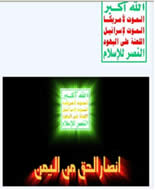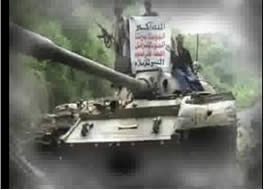
(Photo from Iran's Arabic TV channel, www.alkawthattv.ir).
| THINK-ISRAEL |
| HOME | September-October 2009 Featured Stories | Background Information | News On The Web |
Iranian subversion in Yemen: Iranian websites expose additional evidence of the regime's ideological and religious influence on the Shi'ite rebels in north Yemen and the rebellion's importance for Iran in supporting the Shi'ite minority in the Arab-Muslim world[1]
1. On September 28, 2009, a Persian website associated with Mohsen Rezaei, secretary of the Expediency Council and one of the four candidates for the presidency in June 2009, posted an interview with the Yemeni Shi'ite cleric Dr. Issam al-Imad. Dr. Al-Imad was described as a Yemeni citizen who had recently converted to Shi'a and who was studying its principles at religious seminaries in the Iranian city of Qom. Dr. Al-Imad spoke of the growing Iranian ideological and religious influence on the Houthi rebel leadership in north Yemen. He is well-known from television appearances in Yemen in which he defended Shi'a and was consequently attacked by Sunni Internet forums.

2. The theme of the interview was "The warm and cordial connections between the Houthi leader in Yemen and the Ayatollah Ali Khamenei are a reflection of the ideological and religiously close relations between Hassan Nasrallah and the Ayatollah Khamenei." The main points were the following[:2]
i) Sayid Hussein Houthi [the first leader of the Houthi rebellion, who was killed in 2004] had deep, cordial relations with the Ayatollah Ali Khamenei. Hussein Houthi, who even after his death was considered the rebellion's ideological leader, customarily said on cassettes that the contemporary personality closest to Allah was the Imam Khomeini, and that the Ayatollah Khamenei was continuing his path. According to Issam al-Imad, Hussein Houthi was also influenced by the thought of Hezbollah leader Hassan Nasrallah, and that they had similar political opinions.ii) Abd al-Malek Houthi, Hussein's younger brother [who inherited the role of rebellion leader], spent time in Iran living in Qom. Hussein Houthi also visited Iran, lived in Qom, and made an extensive study of Khomeini's works. He used to say that the Shi'ites in Yemen needed to take the Iranian Republic as their model. He wrote a book called Iran in the philosophy of Hussein Houthi, which was published in a number of editions.
iii) For generations the Houthi tribe was armed. The region in which the Houthis live is considered the Yemeni "weapons market," and that throughout their history Yemenis customarily bought arms from the Houthi tribe. Thus the Iranian regime's call to the Yemenis living in the [rebels'] area to lay down their weapons was meaningless because weapons are an integral part of Yemeni culture.
iv) The Zaydi Shi'ites in Yemen [about 30% of the population] believe in the existence of four imams and not 12 [as do the Shi'ites in Iran]. However, according to Issam al-Imad, the Houthis now believe in 12 imams and therefore they are very close to the Iranian school of Shi'a, and cannot be likened to the Zaydi Shi'ites. Nevertheless, the Zaydi Shi'ites also oppose the current regime even though it is headed by President Al Abdallah Salah, a so-called Zaydi Shi'ite. That is because the president has become an enemy of the Zaydi Shi'ites on account of his support for the Wahhabis [i.e., the Saudi Arabians] and the Salafist Muslims.[3]
3. Iran's influence on the Houthi rebellion's leadership is not only ideological and religious but also has political implications. Propaganda videotapes distributed by the rebels show banners with Iranian-inspired slogans such as "Allah is the greatest of all, Death to America, Death to Israel, A curse on the Jews, Victory to Islam."


LEFT ABOVE: The slogans of the Houthi rebels: "Allah is the greatest of all, Death to America, Death to Israel, A curse on the Jews, Victory to Islam" (From the Houthi rebel forum, linked through Hezbollah's Bint Jbeil website).
RIGHT ABOVE:
Videotape distributed by the Houthi rebels. The slogans appear again
on the sign (manarvideo.com).
4. Iran's important IRdiplomacy website, run by a group of senior diplomats affiliated with the reformists, posted an article entitled "The Iranian broadcasting authority openly supports the rebels in Yemen" (October 6, 2009). It said that the Khabar television network, which belongs to the broadcasting authority, had turned the discussion of the Palestinian issue into a forum for supporting the Houthi rebels.
5. The article also reported that at 6:30 p.m. on October 2, 2009, there had been a discussion of "the tragedy of human rights violations in Palestine." Guests to the program were supposed to contribute their "expert knowledge" of human rights and "the crimes of the Zionist regime" in Palestine and Lebanon. One of the experts spoke enthusiastically about how "we [i.e., the Iranian regime] now relate to Yemen as part of [Iran's] front line, [standing at] the side of Gaza and Lebanon, and we must defend them." He said that the Houthi group was like the Palestinians, adding that "the leader, Abd al-Malek al-Houthi, regards himself as taking the same path as the Imam Khomeini and Iran's Shi'ite revolution." During the program, Khabar TV repeatedly broadcast pictures and videotapes of the Houthi fighting and the rebel leader, Abd al-Malek Houthi.
6. An Internet posting claimed that the remarks made on Khabar TV contradicted official Iranian diplomacy, which denies the reports that Iran supports the Houthi rebels with weapons and money, calling them "baseless." For example, according to the posting, the Iranian embassy in Bahrain rejected the claims that Iran was supporting the rebellion and stressed the need to preserve Yemen's integrity. The posting further stated that this was not the first time discrepancies had been revealed between reports on official Iranian media and Iranian diplomacy.
Footnotes
1 Update of our October 1, 2009 bulletin, "Geopolitically strategic Yemen has become a focus of local Iranian-Saudi Arabian strife" at http://www.terrorism-info.org.il/malam_multimedia/English/eng_n/pdf/iran_e025.pdf.
2 http://www.ayandenews.com/news/13285.
3 Salafiyya is an Islamic school which preaches that the religious behavior of the first generations of Islam should be an example for all Muslims.
|
Editor's Addendum on the Iran-Saudi proxy war in Yemen:
(1) Excerpt from
"Saudis launches offensive against Yemen rebels", November 5, 2009,
SAN'A, Yemen - Saudi Arabia sent fighter jets and artillery bombardments across the border into northern Yemen today in a military incursion apparently aimed at helping its troubled southern neighbor control an escalating Shiite rebellion. (2) Excerpt from "Yemen civil war spills over border as Saudi
official is killed in attack", November 5, 2009, Times Onlline,
Yemen's civil war spilled into neighbouring Saudi Arabia for the first time yesterday when Shia gunmen shot dead a Saudi security officer in a cross-border attack. |
Dr. Reuven Erlich is Director, The Intelligence and Terrorism
Information Center.
This article was published October 13,, 2009 by the
Intelligence and Terrorism Information Center
(http://www.terrorism-info.org.il.) It is archived at
http://www.terrorism-info.org.il/malam_multimedia/English/
eng_n/pdf/iran_e030.pdf
| HOME | September-October 2009 Featured Stories | Background Information | News On The Web |